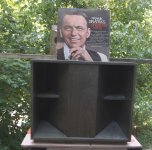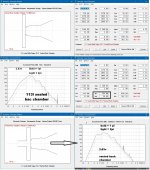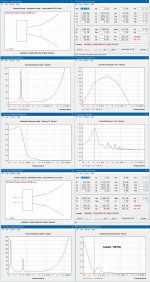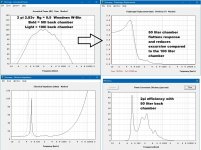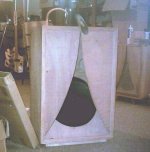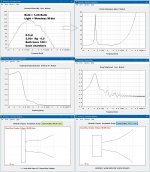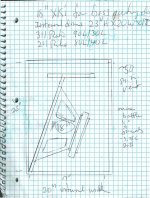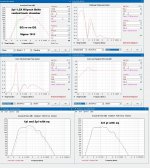A W bin would imo be a dismal and space wasteful thing if one wants low bass. Tapped horn and tapped pipe (constant area or tapering) can be good compared to vented boxes which have small area vents.
A practical vented box solution is to use a "6th order alignment" with peaked/underdamped 2nd order highpass filter such as was done by ElectroVoice with their "Interface"series and Cerwin-Vega with their "Loud" S1 and S2 systems.
Qts should be selected to be ~0.3. Below are notes from the late Dennis Kleitsch ("DJK") which explain how to calculate the box. You can use hornresp to see what happens.
Without the boost at ~fb, the alignment is what Bullock called the "super boombox alignment" which has the best transient response of those in the T-S alignment table.
Here's the pasted notes:
The optimum Qts for an equalized 6th order Butterworth design(not to be confused with a bandpass design)is .312 .The formula for box size is Qts*Qts*4.1*Vas=Vb.The formula for Fb is (Fs/Qts)*.312 .For a Qts of .312 the Faux(eq frequency)=Fb with a Q of 2 .
************************************************** *********************
Box size is roughly proportional to the square of the Qts, so the lower the Q the smaller the box. Also the lower the Q, the higher the efficiency. Bass rolls off though if the Q is too low, the magnet can be too big for its own good.
For a vented box, the optimum Qts is 0.312
0.312 gives the best bass extension, minimum box size, and highest efficiency.
Posted by djk ( M ) on July 25, 2005 at 00:55:59
A 2 cu ft 2nd order sealed box with an F3 of 30hz can only be 0.18% efficient (84.55dB).
A 2 cu ft 4th order vented box with an F3 of 30hz can only be 0.36% efficient (87.56dB).
A 2 cu ft 6th order vented box with an F3 of 30hz can only be 0.90% efficient (91.54dB).
The correct box size for a Qts=0.312 woofer is ~0.4X Vas"
Fb=Fs=Faux, Q=2 for Faux. (~6dB)
Without the Q=2 filter the box is an SBB4 (Super Boom Box 4th order), with the best transient response of all the standard vented alignments, with the filter it is a B6(maximally flat).
Karlson boxes give great impact but are also limited unless tuned low. That said, Exemplar used a standard Karlson K15 tuned to ~28Hz with two 3"ID pvc elbow and boosted at ~Fb to augment their horn system - it sounds very good - I don't understand why as the front chamber's tuning is around 110Hz and should be out of the picture pretty much with an 80Hz or lower crossover.
An 18" speaker can be used in a K15 size K-coupler with good half space support to about 60Hz and will sound powerful even at low levels.
A practical vented box solution is to use a "6th order alignment" with peaked/underdamped 2nd order highpass filter such as was done by ElectroVoice with their "Interface"series and Cerwin-Vega with their "Loud" S1 and S2 systems.
Qts should be selected to be ~0.3. Below are notes from the late Dennis Kleitsch ("DJK") which explain how to calculate the box. You can use hornresp to see what happens.
Without the boost at ~fb, the alignment is what Bullock called the "super boombox alignment" which has the best transient response of those in the T-S alignment table.
Here's the pasted notes:
The optimum Qts for an equalized 6th order Butterworth design(not to be confused with a bandpass design)is .312 .The formula for box size is Qts*Qts*4.1*Vas=Vb.The formula for Fb is (Fs/Qts)*.312 .For a Qts of .312 the Faux(eq frequency)=Fb with a Q of 2 .
************************************************** *********************
Box size is roughly proportional to the square of the Qts, so the lower the Q the smaller the box. Also the lower the Q, the higher the efficiency. Bass rolls off though if the Q is too low, the magnet can be too big for its own good.
For a vented box, the optimum Qts is 0.312
0.312 gives the best bass extension, minimum box size, and highest efficiency.
Posted by djk ( M ) on July 25, 2005 at 00:55:59
A 2 cu ft 2nd order sealed box with an F3 of 30hz can only be 0.18% efficient (84.55dB).
A 2 cu ft 4th order vented box with an F3 of 30hz can only be 0.36% efficient (87.56dB).
A 2 cu ft 6th order vented box with an F3 of 30hz can only be 0.90% efficient (91.54dB).
The correct box size for a Qts=0.312 woofer is ~0.4X Vas"
Fb=Fs=Faux, Q=2 for Faux. (~6dB)
Without the Q=2 filter the box is an SBB4 (Super Boom Box 4th order), with the best transient response of all the standard vented alignments, with the filter it is a B6(maximally flat).
Karlson boxes give great impact but are also limited unless tuned low. That said, Exemplar used a standard Karlson K15 tuned to ~28Hz with two 3"ID pvc elbow and boosted at ~Fb to augment their horn system - it sounds very good - I don't understand why as the front chamber's tuning is around 110Hz and should be out of the picture pretty much with an 80Hz or lower crossover.
An 18" speaker can be used in a K15 size K-coupler with good half space support to about 60Hz and will sound powerful even at low levels.
Last edited:
This was a good 6.2 cubic foot vented box with an Eminence 18 having qts 0.25, fs~30

I don't hate W-bins as have a little one which never got loaded due to a health crisis. etc.
I don't hate W-bins as have a little one which never got loaded due to a health crisis. etc.
Attachments
Last edited:
Thank you for your opinion!A W bin would imo be a dismal and space wasteful thing if one wants low bass. Tapped horn and tapped pipe (constant area or tapering) can be good compared to vented boxes which have small area vents.
A practical vented box solution is to use a "6th order alignment" with peaked/underdamped 2nd order highpass filter such as was done by ElectroVoice with their "Interface"series and Cerwin-Vega with their "Loud" S1 and S2 systems.
Qts should be selected to be ~0.3. Below are notes from the late Dennis Kleitsch ("DJK") which explain how to calculate the box. You can use hornresp to see what happens.
Without the boost at ~fb, the alignment is what Bullock called the "super boombox alignment" which has the best transient response of those in the T-S alignment table.
Here's the pasted notes:
The optimum Qts for an equalized 6th order Butterworth design(not to be confused with a bandpass design)is .312 .The formula for box size is Qts*Qts*4.1*Vas=Vb.The formula for Fb is (Fs/Qts)*.312 .For a Qts of .312 the Faux(eq frequency)=Fb with a Q of 2 .
************************************************** *********************
Box size is roughly proportional to the square of the Qts, so the lower the Q the smaller the box. Also the lower the Q, the higher the efficiency. Bass rolls off though if the Q is too low, the magnet can be too big for its own good.
For a vented box, the optimum Qts is 0.312
0.312 gives the best bass extension, minimum box size, and highest efficiency.
Posted by djk ( M ) on July 25, 2005 at 00:55:59
A 2 cu ft 2nd order sealed box with an F3 of 30hz can only be 0.18% efficient (84.55dB).
A 2 cu ft 4th order vented box with an F3 of 30hz can only be 0.36% efficient (87.56dB).
A 2 cu ft 6th order vented box with an F3 of 30hz can only be 0.90% efficient (91.54dB).
The correct box size for a Qts=0.312 woofer is ~0.4X Vas"
Fb=Fs=Faux, Q=2 for Faux. (~6dB)
Without the Q=2 filter the box is an SBB4 (Super Boom Box 4th order), with the best transient response of all the standard vented alignments, with the filter it is a B6(maximally flat).
Karlson boxes give great impact but are also limited unless tuned low. That said, Exemplar used a standard Karlson K15 tuned to ~28Hz with two 3"ID pvc elbow and boosted at ~Fb to augment their horn system - it sounds very good - I don't understand why as the front chamber's tuning is around 110Hz and should be out of the picture pretty much with an 80Hz or lower crossover.
An 18" speaker can be used in a K15 size K-coupler with good half space support to about 60Hz and will sound powerful even at low levels.
Im looking now in hornresp how to calculate tapped horn.
Tapped horn is what you sugest,and Dave and GM,so probably thats the best way to go.I newer heard one before so thats why im sceptical a little bit about TH.
Sure it looks much better then any ported box and i have faith it sounds also much nicer and cleaner then ported box.
But do i get really nice and clean sound like from horn or not?
Ideally you would want the woofer attached to a wall which separates totally the front emission from the back emission. Ideally you would not want the wall either, but let's assume that from infra-sub frequencies the wavelenghts are longer than wall dimensions so that doesn't count ...some don't agree on the non localization of VLF.
So you say that you have space problem and...you buy a 18". Moreover, you want to put in a horn. You say you don't like 'mudding' effect (of a BR box) and you propose a 'horn'.
So you say that you have space problem and...you buy a 18". Moreover, you want to put in a horn. You say you don't like 'mudding' effect (of a BR box) and you propose a 'horn'.
Yes,i buy 18" becuose from my experinence,you can not go against natural low. I play bass guitar for 20 years and i try many diferent drivers and speaker. And my expirience is that you can not go clean masive deep with 10" driver. There are mane good boxes and cabinet build and make good compromis,but 12" sounds more fatter then 10",15" then 12" etc.Ideally you would want the woofer attached to a wall which separates totally the front emission from the back emission. Ideally you would not want the wall either, but let's assume that from infra-sub frequencies the wavelenghts are longer than wall dimensions so that doesn't count ...some don't agree on the non localization of VLF.
So you say that you have space problem and...you buy a 18". Moreover, you want to put in a horn. You say you don't like 'mudding' effect (of a BR box) and you propose a 'horn'.
But that is just my expirience.
I listen Khorns at my friend and i like horn sound. Coloration,yes they maybe make colorations. SE tube amp coloration,yes they also make big coloration with harmonics. But this is coloration that i like,it gives soul to the music,at least in my perception.
So when i say clean sound,im thinking about sound wich jump on you when it goes out of the box,not frustrated bass wich is like you say mmmm with mouth closed,i want mmmm with open mouth sound if you understand me.
Maybe there are vented box wich can provide the same but i never heard one.
So with that logic and taste,i buy 18 inch woofer,and traying to do best what i can.
I understan that HIFI and PA equipment are diferent worlds,but fizik and dimensions of wave leinght are the same.
Yes, PA and HiFi are different worlds, as live music and reproduction are.
But let's focus to the things that are shared by both.
These are music, or the sound...both travel as electrical in wires... But PA Is public address...
HiFi Is meant for the singular listener?
So is a matter of quantity, like more watts and area of emission for major coverage.
Indeed nowadays the listener (well, churces from the past seem to have some studies in trying to reach the audience) is put in relevance, but in case of DIY the opinion bias is strong so it's better not to rely on the particular sensation of the moment.
Soooo theory and practice:
You want to design things and you have solid foundations in science such mechanics, acustic, phisics and your aims are dictated by your expectations in having the desire to be a perfecly reproduced live execution fulfilled.
That was a strong paragraph, not sure of having placed the right World in the right place, and this ellp...cellphone, the automatico inse🤢rt ahhhhh good morning world!
But let's focus to the things that are shared by both.
These are music, or the sound...both travel as electrical in wires... But PA Is public address...
HiFi Is meant for the singular listener?
So is a matter of quantity, like more watts and area of emission for major coverage.
Indeed nowadays the listener (well, churces from the past seem to have some studies in trying to reach the audience) is put in relevance, but in case of DIY the opinion bias is strong so it's better not to rely on the particular sensation of the moment.
Soooo theory and practice:
You want to design things and you have solid foundations in science such mechanics, acustic, phisics and your aims are dictated by your expectations in having the desire to be a perfecly reproduced live execution fulfilled.
That was a strong paragraph, not sure of having placed the right World in the right place, and this ellp...cellphone, the automatico inse🤢rt ahhhhh good morning world!
OK, ~687.5 L gross, so a pretty big net volume (Vb), but unfortunately a TH is too big if tuned below Fs, so will have to try some other TL alignments.🙁1250mm lenght x 550 mm depth x 1000 mm max height
Looks like a ~16 - 80 Hz folded up tapped inverse tapered TL (TTQWT) will fit in ~650 L, but you will have to figure if it can be folded within your max dimensions.
Due to such a low tuning, power handling is limited to ~50 W/2pi.
Last edited:
You could easily test a H frame with your 18". Maybe you will like the result. It is easy to try.
OK - lets take a Klipsch Belle W-bin and scale it 1.2X for an Eminence Sigma 18 - that's roughly 3 feet wide by 29" tall by 21.5" deep. The path length is somewhat shorter than your drawing but not off horribly for what matters.
Here's the response with a sealed back chamber for 1 pi and 2pi and also for 1 pi and 2pi with the back chamber vented. I didn't put the impedance/excursion graphs in this picture as response was the major question. It could be tuned lower and EQ applied as with 6th order reflex.
Did you pick an 18 inch woofer? (sorry not to have read the thread - I'm shaky from picking out a headstone for my favorite cat)
Here's the response with a sealed back chamber for 1 pi and 2pi and also for 1 pi and 2pi with the back chamber vented. I didn't put the impedance/excursion graphs in this picture as response was the major question. It could be tuned lower and EQ applied as with 6th order reflex.
Did you pick an 18 inch woofer? (sorry not to have read the thread - I'm shaky from picking out a headstone for my favorite cat)
Attachments
Last edited:
OK - I gave a try with your horn - its certainly a pretty fold - i left the Eminence driver from the previous scaled Belle sim - and assumed around 100 liters for the back chamber (they can be too large and have to be blocked down in volume)
I probably botched something - take a look - I added a vent for one sim.
I think the rise in excursion below 100Hz is where the horn has transitioned to a mass loaded BP4 of sorts. A smaller back chamber can help.
I probably botched something - take a look - I added a vent for one sim.
I think the rise in excursion below 100Hz is where the horn has transitioned to a mass loaded BP4 of sorts. A smaller back chamber can help.
Attachments
Here's 2pi performance. FWIW for punch I would consider a K18 Karlson box - but will not go "low" - guess some things depend upon your favorite genre and when/how its recorded. (The K18 could always become your bass rig. That box with an 18 was 226 liters external volume and good to ~60Hz )
Attachments
Here's that 1.2X scale Belle vs your horn in 0.5 pi conditions with both having 100l back chambers and the same Eminence Sigma II 18 driver/
- performance is virtually identical but Belle (and La Scala) has a flat spot in ifs path where there's no expansion and that shows in the response curve.
- performance is virtually identical but Belle (and La Scala) has a flat spot in ifs path where there's no expansion and that shows in the response curve.
Attachments
Best IME to tune it to the horn's BW mean, i.e. sqrt(throat frequency*mouth frequency), so only reduce it if the box will be too small to contain the driver.assumed around 100 liters for the back chamber
Thank you very much freddi!Here's that 1.2X scale Belle vs your horn in 0.5 pi conditions with both having 100l back chambers and the same Eminence Sigma II 18 driver/
- performance is virtually identical but Belle (and La Scala) has a flat spot in ifs path where there's no expansion and that shows in the response curve.
So now we are going somewhere.
Back chamber in my design is 111 liters,with woofer volume.
Im gona check belle dimensions to see what can i do in my mesurments. Belle is maller so maybe i can copy mesurments and see where that go. But,w bin also looks ok regarding how is calculeted and constructed.
Thank you very much!
Its time for redrawing!
Im gona post plans when i finish belle-scale-clone-fited in my mesurments.
Cheers!
If i put karson box side on the floor insted of bottom on the floor,has that any impact on the sound?Here's 2pi performance. FWIW for punch I would consider a K18 Karlson box - but will not go "low" - guess some things depend upon your favorite genre and when/how its recorded. (The K18 could always become your bass rig. That box with an 18 was 226 liters external volume and good to ~60Hz )
Probably not in the bass region but IIRC sounds worse when run full range. Karlson's K12 (and assume the "Dutch K12") could be fun with FE206 - again won't go s low as a long path BLH but fun and punchy.
for a bass guitar box no more than 2 foot tall maybe something like below with K-aperture would work OK
for a bass guitar box no more than 2 foot tall maybe something like below with K-aperture would work OK
Attachments
With 111 liter back chamber you could have the option of venting it plus EQ. Whether that would sound better = ? but seems like it could add low end extension. You could ask about sound quality from those who tried DJK's "Vented La Scala" mod.
Attachments
Here's a thread with the old DB Keele JR. K151 W-bin:
https://www.audioheritage.org/vbull...80-s-Don-Keele-amp-Mark-Gander-JBL-horn-plans
In the same bulk one could pack a longer 1/4 wave path.
https://www.audioheritage.org/vbull...80-s-Don-Keele-amp-Mark-Gander-JBL-horn-plans
In the same bulk one could pack a longer 1/4 wave path.
Oo,that sound like a good compromise. You think i can go deeper with that combination and have clean sound?With 111 liter back chamber you could have the option of venting it plus EQ. Whether that would sound better = ? but seems like it could add low end extension. You could ask about sound quality from those who tried DJK's "Vented La Scala" mod.
As i can see,peopel are satisfied with vented lascalas.La scala sonud stayed and they get extra lows.
I like thise idea. It was also in my mind. When i finish plans and when i see how big is back chamber,it goes trough my head,hm,this will probabley go much lower ported,but i was not sure how will that impact on sound quality.
And what do you recomend for port? Normal tube ports or something else?
- Home
- Loudspeakers
- Subwoofers
- Help calculating W-bin folded horn HIFI
